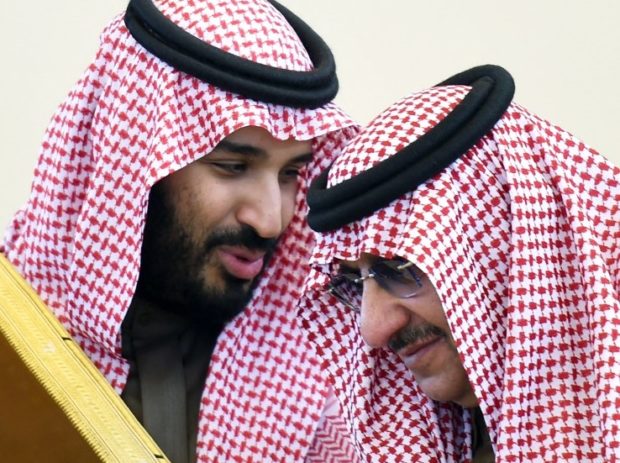
This file photo taken on Dec. 9, 2015, shows then Saudi Defense Minister Mohammed bin Salman (left) talking with Crown Prince and Interior Minister Mohammed bin Nayef during the 136th Gulf Cooperation Council (GCC) summit in Riyadh.
Saudi King Salman on June 21, 2017, named his son Mohammed bin Salman as crown prince, completing a gradual removal of powers from the previous prince Mohammed bin Nayef, who has been fired. AFP
RIYADH, Saudi Arabia — Saudi Arabia’s King Salman ousted his nephew as crown prince on Wednesday and installed his son Mohammed bin Salman, capping a meteoric rise for the 31-year-old that puts him one step from the throne.
US President Donald Trump congratulated the young royal during a phone call in which the White House said they committed to close cooperation on “security, stability, and prosperity across the Middle East and beyond”.
Prince Mohammed’s rise comes at a crucial time for Saudi Arabia which is in a battle for regional influence with arch-rival Iran, bogged down in a controversial military intervention in neighboring Yemen and at loggerheads with fellow US Gulf ally Qatar.
The White House said Trump discussed with him “the priority of cutting off all support for terrorists and extremists, as well as how to resolve the ongoing dispute with Qatar”.
Qatar’s Emir Sheikh Tamim bin Hamad Al-Thani also congratulated the new crown prince, expressing hopes for “brotherly relations between the two brotherly countries”.
Prince Mohammed already wielded huge power before he became heir, spearheading a sweeping economic and social reform program for the ultraconservative kingdom.
The prince is now “de facto ruler of the kingdom,” said Andreas Krieg of the Defense Studies Department at King’s College London. “The king needed to strengthen his son’s position amid the current turmoil in the region.”
Mohammed’s youth is a novelty for a country used to ageing leaders — King Salman is 81 and his predecessor King Abdullah died in 2015 aged around 90.
His rapid ascent in the past two years has symbolized the hopes of the kingdom’s young population, more than half of which is under 25.
Stocks rise
Saudi television channels showed the bearded Mohammed bin Salman kissing the hand of his ousted cousin Mohammed bin Nayef and kneeling in front of the older prince, who patted his shoulder to congratulate him.
“I am going to rest now. May God help you,” the former crown prince said, to which his replacement replied: “May God help you. I will never do without your advice.”
The king called on governors and other princes to pledge allegiance to his new heir and ordered a ceremony — routine on such occasions — after night prayers on Wednesday at a royal palace in Mecca.
Top Saudi officials pledged loyalty to their new crown prince in statements carried by the official news agency, while many ordinary citizens tweeted their allegiance.
But support for Mohammed has not been unanimous.
A royal order said his appointment was endorsed by 31 of 34 members on the Council of Allegiance, which decides on succession issues.
The king accompanied his son’s elevation with measures to woo the many Saudis who work for the government, either as civilian or military personnel.
The enticements come as the kingdom’s war in Yemen drags on and citizens for the first time pay taxes, imposed after oil prices fell.
Salman ordered the reinstatement of all civil service benefits cut in a controversial move as part of an austerity package late last year.
He also extended the end-of-Ramadan Eid Al-Fitr holidays until July 9 for civil servants.
One Saudi, Sultan al-Asimi, 33, said in Mecca that Mohammed’s appointment sends a message of “hope and trust about the future of the country”.
The Saudi stock market seemed to agree. It closed 5.5 percent higher on news of Mohammed’s appointment as well as word that the exchange had moved closer to joining a major global index.
‘Expected for a long time’
As deputy crown prince, the new heir to the throne already held multiple posts.
He is the main champion of the kingdom’s Vision 2030 reform plan to bring social and economic change to the oil-dependent economy of a country where women’s rights are among the most restricted in the world.
Mohammed is also defense minister with overall responsibility for the kingdom’s military intervention in Yemen.
Sunni-dominated Saudi Arabia leads a coalition supporting the Yemeni government against Shiite rebels who control the capital Sanaa.
The coalition’s bombing campaign has drawn repeated criticism from human rights groups for the high number of civilian casualties.
Saudi Arabia’s intervention in Yemen in March 2015 signaled a more aggressive foreign policy, emphasized again this month when the kingdom and its allies imposed an embargo on neighboring Qatar.
They also accused Doha of supporting extremists, a charge it denies.
An April government and security shake-up prepared the way for Mohammed’s rise, when a number of his allies were appointed to prominent positions and a brother was named ambassador to Washington.
While the exact timing of such a move had been uncertain, “it has been expected for a long time,” said analyst Riad Kahwaji, founder of the Institute for Near East and Gulf Military Analysis (INEGMA).
The ousted crown prince, Mohammed bin Nayef, 57, has also been fired as deputy prime minister and interior minister.
His nephew, Prince Abdulaziz bin Saud bin Nayef, was named to replace him.
He takes control of the security forces while the kingdom faces periodic shootings and bombings claimed by the Islamic State group, as well as discontent among its Shiite minority. CBB